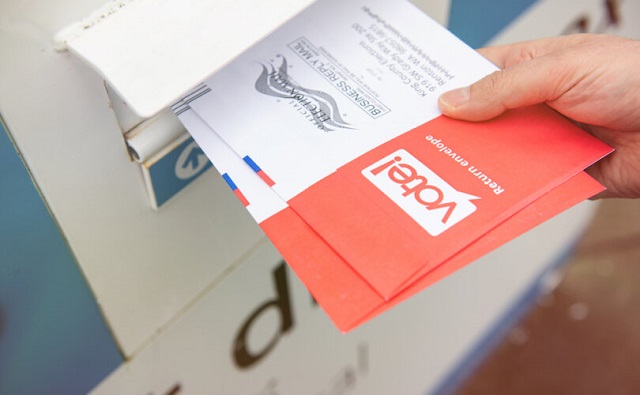Alberta
2022 – the year fossil fuels once again became a preferred source of reliable, affordable energy

A worker walks past gas pipes at Uniper’s new LNG import terminal in Wilhelmshaven, northern Germany on December 17, 2022. Getty Images photo
From the Canadian Energy Centre Ltd.
By David Yager
David Yager is an oilfield service executive, oil and gas writer, and energy policy analyst. He is author of From Miracle to Menace – Alberta, A Carbon Story.
The only part of the demise of oil and gas that was successful was reduced supply
It seems like just the other day the wrath of the world was coming down on oil sands and coal.
To protect the atmosphere, Canada has been reducing coal-fired power generation for years. It started in Ontario then moved to Alberta. Saskatchewan is next. New Brunswick is supposed to stop by 2030, but that province claims it can’t be done.
Global coal consumption is rising again because it meets the cost and availability requirement created by energy shortages and rising prices. On December 16, the International Energy Agency reported, “The world’s coal consumption is set to reach a new high in 2022 as the energy crisis shakes markets.”
For energy, the biggest single change in 2022 is the remarkable shift in public attitudes towards fossil fuels.
The global energy complex is under assault by Russia’s invasion of Ukraine, the exposed shortcomings of wind and solar, years of underinvestment in fossil fuels, and rising inflation and interest rates.
But for the past ten years, there has been an all-out crusade against fossil fuels. Oil company CEOs were branded climate criminals. It was morally reprehensible to own fossil fuel company shares or loan money to oil, gas or coal producers. Elections were won in Canada, the US and in Europe on pledges to replace fossil fuels.
No cost was too great, because the cost of doing nothing thus permitting unchecked climate damage was greater.
What happened? How did the channel change to rapidly? Why after years of public and political attacks on the source of over 80 per cent of the world primary energy, has affordable energy on demand now become more important than where it comes from?
Price, the most fundamental driver of economics and human behavior.
The November 2022 global survey from public opinion research firm IPSOS titled “What Worries The World” tells the story.
IPSOS explains, “This 29-country Global Advisor survey was conducted…among 20,466 adults aged 18-74 in Canada, Israel, Malaysia, South Africa, Turkey and the United States, 20-74 in Indonesia and Thailand, and 16-74 in all 21 other countries.”

IPSOS charts the top six issues for the past two years. Poverty, crime, unemployment and corruption have always been important, and consistently ranked among the top five.
But in November 2020, inflation only registered among eight per cent of respondents. Two years later it is 42 per cent. Coronavirus and the unemployment that accompanied the lockdowns were the top two issues. The others remain in a consistent range.
Two years ago was the peak of the “oil is dead” mantra, and when many bright ideas for a fossil fuel free future were concocted. In a post-pandemic world, multiple voices claimed we must Build Back Better, ensure a Resilient Recovery, engineer the Great Reset.
The plan was to use government policy and borrowed money to create jobs through the large-scale replacement of fossil fuels.
Coined the “energy transition,” it was achievable and inevitable thanks to incredible advances in renewable energy cost and supply. Canada – the world’s fifth largest combined oil and gas producer – could lead the charge with minimal disruption thanks to a new federally-funded retraining program for displaced oil workers. This was called a Just Transition.
What happened?
The invisible hand of Adam Smith punched the world in the nose.
The only part of the demise of fossil fuels that was successful was reduced supply. As the economy recovered, consumers learned the hard way that low carbon energy sources were terribly oversold in terms of reliability, and demand for fossil fuels outstripped supply.
Prices for fossil fuels rose at the same time that inflation and interest rates reduced disposal income.
As demand grew, fossil fuel shortages were reflected in the price. When Russia – one of the world’s largest oil, gas and coal suppliers – invaded Ukraine, the gravity of the situation escalated immediately.
What the IPSOS survey dramatically illustrates is the number one concern for the world as 2022 ends is the rising cost of everything.
We’ve been told repeatedly that continued fossil fuel consumption will cause serious climate disruptions. No expense today will exceed the cost of future damages.
However, the more pressing issue today is still being alive in 2050 because of the rising cost of everything, including energy. Worrying about what the temperature, storm intensity or chemical composition of the atmosphere may be in 28 years has become an unaffordable luxury.
So fossil fuels are once again what they have always been – reliable and affordable sources of energy.
Happy New Year.
Alberta
Former senior financial advisor charged with embezzling millions from Red Deer area residents

News release from Alberta RCMP
Former senior financial advisor charged for misappropriating nearly $5 million from clients
On April 4, 2024, the RCMP’s Provincial Financial Crime Team charged a Calgary resident for fraud-related offences after embezzling millions of dollars from his clients while serving as a senior financial advisor.
Following a thorough investigation, the accused is alleged to have fraudulently withdrawn funds from client accounts and deposited them into bank accounts he personally controlled. A total of sixteen victims were identified in the Red Deer area and suffered a combined loss of nearly $5 million.
Marc St. Pierre, 52, a resident of Calgary, was arrested and charged with:
- Fraud over $5,000 contrary to section 380(1)(a) of the Criminal Code; and,
- Theft over $5,000 contrary to section 344(a) of the Criminal Code.
St. Pierre is scheduled to appear in Red Deer Provincial Court on May 14, 2024.
“The ability for financial advisors to leverage their position to conduct frauds and investment scams represents a significant risk to the integrity of Alberta’s financial institutions. The investigation serves as an important reminder for all banking clients to regularly check their accounts for any suspicious activity and to report it to their bank’s fraud prevention team.”
- Sgt. John Lamming, Provincial Financial Crime Team
The Provincial Financial Crime Team is a specialized unit that conducts investigations relating to multi-jurisdictional serious fraud, investments scams and corruption.
Alberta
Political parties will be part of municipal elections in Edmonton and Calgary pilot projects

Strengthening Alberta’s local elections
Alberta’s government is introducing legislation to ensure Albertans can rely on transparent, free and fair elections, and municipally-elected officials have clearer accountability measures.
In a democratic society, Albertans expect their local elections to be free and fair, and their elected officials to be held to account by clear rules that govern their local councils. The Municipal Affairs Statutes Amendment Act proposes amendments to the Local Authorities Election Act (LAEA) and the Municipal Government Act (MGA) to add greater transparency to local election processes and ensure local councils and elected officials continue to remain accountable to the citizens who elected them.
“Our government is committed to strengthening Albertans’ trust in their local governments and the democratic process that elects local leaders. The changes we are making increase transparency for Alberta voters and provide surety their votes will be counted accurately. We know how important local democracy is to Albertans, and we will work with local authorities to protect and enhance the integrity of local elections.”
Local Authorities Election Act
Albertans expect free and fair elections and that’s why it’s important we strengthen the rules that govern local elections. To strengthen public trust in local elections, Alberta’s government will eliminate the use of electronic tabulators and other automated voting machines. All Albertans should be able to trust the methods and results of local elections; requiring all ballots to be counted by hand, clarifying rules and streamlining processes for scrutineers will provide voters greater assurance in the integrity of the results.
All eligible Albertans should be able to vote in local elections without impediment. Alberta’s government will limit the barriers for eligible voters to cast a ballot by expanding the use of special ballots. Currently, special ballots can only be requested for very specific reasons, including physical disability, absence from the municipality, or for municipal election workers. By expanding the use of special ballots, the government is encouraging more voter participation.
Amendments in the Municipal Affairs Statutes Amendment Act would increase transparency in local elections by enabling political parties at the local level. Political parties would be enabled in a pilot project for Edmonton and Calgary. The act will not require candidates to join a political party in order to run for a local or municipal office, but will create the opportunity to do so.
In addition, proposed changes to the Local Authorities Election Act would allow municipalities the option to require criminal record checks for local candidates, thus increasing transparency and trust in candidates who may go on to become elected officials.
Municipal Government Act
The role of an elected official is one with tremendous responsibility and expectations. Changes proposed to the Municipal Government Act (MGA) will strengthen the accountability of locally elected officials and councils. These include requiring mandatory orientation training for councillors, allowing elected officials to recuse themselves for real or perceived conflicts of interest without third-party review and requiring a councillor’s seat to become vacant upon disqualification.
If passed, the Municipal Affairs Statutes Amendment Act will also unlock new tools to build affordable and attainable housing across Alberta. Proposed amendments under the MGA would also create more options for municipalities to accelerate housing developments in their communities. Options include:
- Exempting non-profit, subsidized affordable housing from both municipal and education property taxes;
- Requiring municipalities to offer digital participation for public hearings about planning and development, and restricting municipalities from holding extra public hearings that are not already required by legislation; and
- Enabling municipalities to offer multi-year residential property tax exemptions.
Municipal Affairs will engage municipalities and other partners over the coming months to hear perspectives and gather feedback to help develop regulations.
Quick facts
- The LAEA establishes the framework for the conduct of elections in Alberta municipalities, school divisions, irrigation districts and Metis Settlements.
- The MGA establishes the rules governing the conduct of local elected officials once on council, as well as the overall administration and operation of municipal authorities in Alberta, including any policy those authorities may wish to implement.
Related information
-

 Automotive1 day ago
Automotive1 day agoThe EV ‘Bloodbath’ Arrives Early
-

 CBDC Central Bank Digital Currency16 hours ago
CBDC Central Bank Digital Currency16 hours agoA Fed-Controlled Digital Dollar Could Mean The End Of Freedom
-

 Business1 day ago
Business1 day agoHonda deal latest episode of corporate welfare in Ontario
-

 espionage1 day ago
espionage1 day agoOne in five mail-in voters admitted to committing voter fraud during 2020 election: Rasmussen poll
-

 Brownstone Institute15 hours ago
Brownstone Institute15 hours agoThe Numbers Favour Our Side
-

 Frontier Centre for Public Policy11 hours ago
Frontier Centre for Public Policy11 hours agoHow much do today’s immigrants help Canada?






